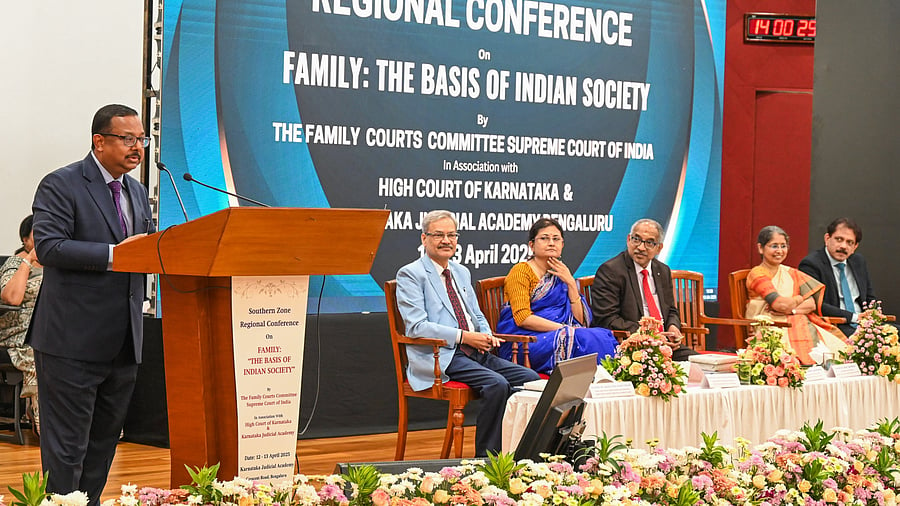
The speakers at the Southern Zone Regional Conference on "Family: The Basis of Indian Society" at the Karnataka Judicial Academy on Sunday.
Credit: DH Photo
Bengaluru: The Southern Zone Regional Conference on "Family: The Basis of Indian Society" concluded on Sunday at the Karnataka Judicial Academy, with a strong call to strengthen the infrastructure and efficiency of family courts.
The final day of the two-day event featured two key sessions: one on parental custody and the other on structural and human resource requirements of the family justice system.
The day began with a session on "Parental Custody of Children: Orders Regarding Visitation Rights and Custody Issues”, chaired by Justice G Jayachandran of the Madras High Court and co-chaired by Justice Kauser Edappagath of the Kerala High Court. The speakers included Justice Moushumi Bhattacharya of the Telangana High Court and senior advocate and mediator S Sushila from Bengaluru.
The valedictory session focused on “Efficiency of Family Courts: Human Resources and Infrastructure.” The speakers included Justice Ravi Nath Tilhari (Andhra Pradesh), Justice Anu Sivaraman (Karnataka), Justice CS Dias (Kerala), Justice G Jayachandran, and Moushumi.
Anu highlighted the infrastructure challenges in Karnataka, noting that only seven of Bengaluru’s 21 family courts are operational. “A new court complex is expected within the next one or two years to accommodate the remaining courts,” she said.
She also pointed out that only 552 of the 991 sanctioned staff positions are filled, placing a heavy burden on existing personnel. To reduce stress, she recommended limiting the tenure of family court judges to two years.
Delivering the valedictory address, Supreme Court judge and Family Courts Committee member Justice Ujjal Bhuyan underlined the need to preserve the dignity of women in family matters. “There is a great deal of power imbalance within a family. Judges must remain mindful of that,” he said.
Citing ancient texts, he observed, “The Rig Veda says no one is superior and all must work for all — but somewhere, that tradition was distorted, as seen in the Manusmriti, which claims that whatever is acquired by a wife belongs to the husband.”
Bhuyan emphasised that the role of a family court judge goes beyond dispute resolution — it includes upholding the dignity of all individuals. He also affirmed that non-traditional family structures, such as queer families, live-in partnerships, and single-parent households deserve equal recognition and rights.
